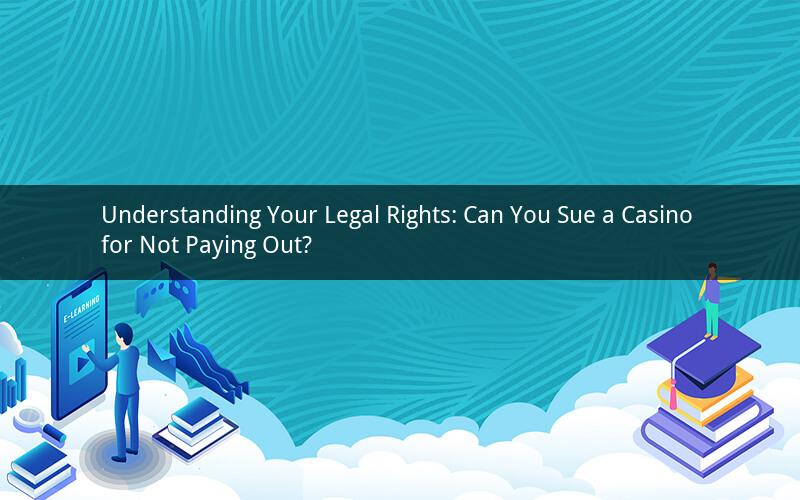
Introduction:
Casino gambling is a popular form of entertainment for many individuals, but disputes over payouts can arise. One common question that arises is whether or not you can sue a casino for not paying out your winnings. In this article, we will explore the legal aspects of this issue, providing you with valuable insights and information.
1. Can You Sue a Casino for Not Paying Out?
Yes, you can sue a casino for not paying out your winnings. However, it is important to understand the legal process and the factors that may affect your case. Here are some key considerations:
1.1 Validity of the Win:
The first and foremost factor in determining whether you can sue a casino is the validity of your win. If you have a legitimate win, you have a stronger legal claim. This can be established through various means, such as receipts, video evidence, or witness testimony.
1.2 Casino Policies:
Casinos have specific policies and terms and conditions that govern their operations. It is crucial to review these policies to determine if you have violated any rules that may have resulted in the refusal to pay out your winnings. If the casino's policies are unclear or unfair, it may strengthen your case.
1.3 Contractual Agreements:
When you enter a casino, you implicitly enter into a contract with the casino. This contract outlines the terms and conditions of the gambling agreement. If the casino breaches this contract by not paying out your winnings, you may have grounds to sue.
1.4 Jurisdiction:
The jurisdiction in which you file your lawsuit is crucial. Different countries and states have different laws and regulations regarding gambling and casinos. It is important to consult with a legal professional to determine the appropriate jurisdiction for your case.
2. Gathering Evidence:
To build a strong case, you need to gather evidence that supports your claim. Here are some essential steps to consider:
2.1 Keep Documentation:
Keep all documentation related to your gambling activities, including receipts, tickets, and any correspondence with the casino. These documents can serve as crucial evidence in your case.
2.2 Video Evidence:
If available, video evidence can be a powerful tool in proving your win. Casinos often have surveillance cameras, so it may be necessary to request and review the footage to establish the validity of your win.
2.3 Witness Testimony:
If you have witnessed your win or if there were other individuals present, their testimonies can provide valuable support to your case. Gather their contact information and prepare to present their statements if necessary.
3. Legal Representation:
Suing a casino can be a complex and challenging process. It is advisable to seek legal representation from an attorney who specializes in gambling law. They can provide you with expert advice, help gather evidence, and navigate the legal system on your behalf.
4. Potential Challenges:
While it is possible to sue a casino for not paying out, there are certain challenges you may encounter:
4.1 Casino's Defense:
Casinos have legal teams and may employ various defenses to challenge your claim. They may argue that you violated the terms and conditions of the contract or that the win was not legitimate. It is crucial to have a strong case and legal representation to counter these defenses.
4.2 Jurisdictional Limitations:
Some jurisdictions may have specific laws that limit the ability to sue casinos. It is important to consult with a legal professional to understand the limitations in your jurisdiction.
4.3 Cost and Time:
Suing a casino can be an expensive and time-consuming process. It is essential to consider the financial and time commitments involved before pursuing legal action.
5. Alternatives to Lawsuits:
If suing a casino seems daunting or not feasible, there are alternative options you can explore:
5.1 Mediation:
Mediation is a voluntary and confidential process where a neutral third party helps facilitate a resolution between you and the casino. It can be a cost-effective and less adversarial approach to resolving your dispute.
5.2 Consumer Protection Agencies:
Contacting consumer protection agencies can provide you with guidance and support. They may be able to assist you in resolving the issue without resorting to legal action.
5.3 Legal Advice:
Consulting with a legal professional can provide you with a clearer understanding of your rights and options. They can offer advice tailored to your specific situation.
Conclusion:
While it is possible to sue a casino for not paying out your winnings, it is essential to understand the legal process and the factors that may affect your case. By gathering evidence, seeking legal representation, and exploring alternative options, you can increase your chances of obtaining a favorable outcome. Remember to consult with a legal professional to ensure that your rights are protected throughout the process.